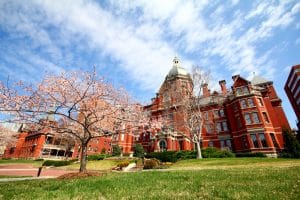Johns Hopkins Graduation Rate
The graduation rate is crucial for illustrating a university’s effectiveness in promoting student academic success. A school’s endeavor isn’t confined to providing good programs or attracting students but also to seeing them through until they achieve academic success. As one of the leading universities globally, Johns Hopkins University has consistently achieved high graduation rates.
Understanding the Importance of Graduation Rates
Graduation rates provide considerable insight into a university’s overall performance and effectiveness, marking them as significant metrics in higher education. These rates represent the percentage of students who complete their studies and graduate within a specified period.
Graduation rates are highly dependent upon while formulating academic policies and for institutional accreditation, funding, and ranking. They significantly contribute to institutional reputation and attractiveness for potential students and faculty.
When examining graduation rates, it is essential to consider the various factors influencing them. These factors can include the quality of academic programs, the availability of support services, and the overall campus climate. By understanding these factors, universities can better identify areas for improvement and implement strategies to increase graduation rates.
The Role of Graduation Rates in Higher Education
A high graduation rate indicates that a university is dedicated to equipping its students with the knowledge and skills necessary for successful academic completion. It solidifies the institution’s credibility and its commitment to academic excellence. Higher graduation rates also indicate the quality of the student experience, both academically and non-academically.
Furthermore, graduation rates play a crucial role in shaping the future of higher education. They provide valuable data that can be used to assess the effectiveness of different educational approaches and programs. This information can then be used to inform policy decisions and improve the overall quality of education.
On the other hand, lower graduation rates may indicate potential issues at a university, such as inadequate academic support, lack of financial aid options, or an unfavorable campus climate. Therefore, tracking and striving to improve these rates is crucial for higher education institutions.
Universities prioritizing graduation rates understand the importance of providing students with the necessary resources and support to succeed. This includes offering academic advising, tutoring services, and career development programs. By investing in these areas, universities can create an environment that fosters student success and ultimately leads to higher graduation rates.
How Johns Hopkins Compares to National Averages
Ahead of many, Johns Hopkins University stands out compared to national averages. At Johns Hopkins, the institutional focus is always on maintaining and improving this record. This achievement is rendered possible by various factors that collectively aid student success.

One of the key factors contributing to Johns Hopkins‘ high graduation rates is its rigorous academic programs. The university offers various majors and minors, allowing students to pursue their passions and interests. Additionally, the faculty at Johns Hopkins are renowned experts in their fields, providing students with a world-class education.
Another factor that sets Johns Hopkins apart is its commitment to providing comprehensive support services. The university offers academic advising, tutoring, and mentoring programs to ensure students have the necessary resources to succeed. Additionally, Johns Hopkins provides ample financial aid options, making education more accessible to students from diverse backgrounds.
Furthermore, the campus climate at Johns Hopkins is known for its inclusivity and supportiveness. The university fosters community and belonging, creating an academic and personal environment where students can thrive. This positive campus climate contributes to higher graduation rates as students feel supported and motivated to complete their studies.
What Is the Graduation Rate for Johns Hopkins University?
Thousands of students desire to be a part of this university because of its prestige. Nowadays, graduation rates have become one of the deciding factors in whether to enroll in a school or not. So, what is the graduation rate for Johns Hopkins University?
The Johns Hopkins graduation rate was 95 percent, comprised of 1,285 students out of 1,358 candidates who finished their degree within 150% normal time.
Graduation Rates By Gender
The previous academic year had a total of 632 male and 653 female students completing the requirements necessary to graduate from the institution.
|
Candidates for Graduation |
Completers | Johns Hopkins Graduation Rate | |
|
Total Students |
1,358 |
1,285 |
94.62% |
|
Male |
678 |
632 |
93.22% |
| Female | 680 | 653 |
96.03% |
Graduation Rates By Completion Period
A total of 1,187 students finished their program within the allotted time of four years, and 79 of them went on to earn their bachelor’s degree or an equivalent for an additional year. Within the 150% normal time or six-year period, an additional 19 students graduated from the university.
|
Completion Period |
Johns Hopkins Graduation Rate | % of Male Students | % of Female Students |
|
4 Years or Less |
87.41% |
83.04% |
91.76% |
|
5 Year |
93.23% |
91.15% |
95.29% |
|
6 Year |
94.62% |
93.22% |
96.03% |
A graduation rate is a measure of how many students who started in the same cohort will graduate within six years for programs that are four years long or within three years for two-year programs. This rate represents the percentage of students who complete their degrees within the allotted period after enrolling in the program.
A higher graduation rate may be an indication that students’ resources, time, and investment in a program at a particular school will likely be worthwhile, so it can also help prospective students evaluate the quality of a school. This is because higher graduation rates are statistically more likely to occur.
The Factors Contributing to Johns Hopkins’ Success
Several factors contribute to the high graduation rates at Johns Hopkins University. A review of the university’s approach toward student success reveals various strategies and resources that facilitate a conducive environment for learning, collaboration, and overall academic success.
One key factor contributing to Johns Hopkins’ success is the strong emphasis on academic support and resources. The university recognizes the importance of providing students with the tools and assistance to thrive academically.
To this end, Johns Hopkins offers numerous support services to help students excel. These services include academic advising, tutoring, career services, counseling, and library resources. By providing a wide range of resources, the university ensures that students can access the support they need to overcome challenges and achieve their academic goals.
In addition to the various support services, Johns Hopkins is known for its commitment to innovative teaching. The university leverages technology to enhance student learning experiences, creating a tech-enabled ecosystem that allows students to learn at their own pace and in diverse settings.
This approach caters to different learning styles and encourages students to take ownership of their education. By embracing innovative teaching methods, Johns Hopkins creates an engaging, dynamic learning environment that fosters academic success.

Another factor contributing to Johns Hopkins’ success is its faculty’s excellence and student engagement. The university boasts a world-class faculty that is highly qualified and deeply invested in student success.
The faculty at Johns Hopkins frequently challenges and inspires students to be creative, think critically, and solve real-world problems. This high student-faculty engagement fosters a vibrant academic culture of questioning, learning, and growth.
Students are encouraged to actively participate in their education, which enhances their understanding of the subject matter and makes academics exciting and enjoyable. This cheerful and stimulating environment plays a significant role in the high graduation rates at Johns Hopkins.
The Impact of High Graduation Rates on Students
Achieving a high graduation rate is essential for the university’s reputation and the student’s prospects. When a university boasts a high graduation rate, the institution is dedicated to providing a quality education and ensuring students have the necessary support to succeed. This commitment to student success extends beyond the classroom and profoundly impacts graduates’ career prospects.
Career Prospects for Graduates
Graduating from a university with a high graduation rate often leads to favorable job prospects. Employers tend to have a positive bias for graduates from such institutions as it is generally perceived that these students are likely more skilled, committed, and better prepared for work challenges.
For example, at Johns Hopkins University, graduates have a strong advantage in the job market. The university’s rigorous academic programs and emphasis on practical skills development ensure that students are well-equipped to excel in their chosen fields. Employers recognize the value of a Johns Hopkins degree and actively seek out graduates for employment opportunities.
Johns Hopkins University’s approach to education has helped its graduates lead successful careers in various disciplines. Whether in medicine, engineering, business, or the arts, alums from Johns Hopkins have made significant contributions and achieved remarkable success. This directly inspires current students, knowing they are part of an institution with a proven track record of success.
Alumni Success Stories
Johns Hopkins University has many success stories, with its alums excelling in various fields worldwide. The commitment to fostering a diverse and encouraging environment allows students to explore their interests and achieve their ambitions.
Johns Hopkins alums have become influential leaders, groundbreaking researchers, and renowned artists. Their accomplishments testify to the university’s attention to nurturing talent and providing a platform for students to thrive.

Therefore, the high graduation rate at Johns Hopkins is more than just a number. It’s a testament to the university’s commitment to student success. Each graduate represents a success story, a testament to the transformative power of education and the impact it can have on individuals and society as a whole.
Furthermore, the success of alums from Johns Hopkins University creates a strong network of professionals who support and mentor current students. This network provides invaluable connections and opportunities for internships, research collaborations, and career guidance.
As students embark on their academic journey at Johns Hopkins, they can be confident that they are part of a community that values their success and is committed to helping them achieve their goals. The high graduation rate is a constant reminder of the university’s student excellence and lifelong impact on its graduates.
What Are the Implications for Prospective Students?
For prospective students, the graduation rate at Johns Hopkins University is more than just a number—it’s a lens through which you can gauge the institution’s commitment to academic excellence, student support, and overall success.
A high graduation rate often indicates a well-rounded educational experience, where students are enrolling and completing their degrees promptly. This speaks volumes about the quality of faculty, the rigor of the curriculum, and the availability of resources like academic advising and mental health services.
So, when you see that Johns Hopkins’ graduation rate is impressively high, know it’s a testament to the university’s holistic approach to education. This information can help you decide whether this esteemed institution aligns with your academic and personal goals.
How to Interpret the Graduation Rate When Considering Johns Hopkins
When considering Johns Hopkins as your academic home, digging deeper into what the graduation rate means is essential. A high graduation rate is undoubtedly a positive indicator, but it’s also necessary to consider the context.
For instance, how does the rate compare to other schools in the same tier? Are there significant disparities in graduation rates between different majors or demographic groups? Understanding these nuances can offer you a more comprehensive view of what to expect.
Johns Hopkins’ graduation rate is not just a statistic; it reflects the institution’s values, the quality of its programs, and its commitment to student success. Therefore, don’t just take the number at face value; scrutinize it, question it, and use it to measure how well the university aligns with your aspirations.
What Questions Should You Ask on Your Campus Tour?
Your campus tour is the perfect opportunity to delve into the factors contributing to Johns Hopkins’ graduation rate. Don’t hesitate to ask pointed questions. Inquire about the availability and effectiveness of academic advising. What kind of support does the university offer for students struggling academically or emotionally? Are there mentorship programs, and how accessible are professors outside the classroom?

You might also want to ask about financial aid options, as economic stability can significantly impact your ability to graduate on time. These questions will give you insights into the university’s infrastructure and show you how proactive the institution is about maintaining its high graduation rate.
Tips for Ensuring Yowellbeing and Graduation
Once you’ve decided to attend, there are several strategies you can employ to ensure that you’re among the successful statistics contributing to Johns Hopkins’ graduation rate. First and foremost, take advantage of academic advising early on to map out your educational journey.
Time management is crucial; balancing academics and extracurricular activities requires a plan. Don’t hesitate to seek help, whether academic tutoring or mental health resources. Engage with your professors and classmates to build a support network.
Lastly, be mindful of your financial situation and apply for scholarships or work-study programs to alleviate financial stress. Your success and timely graduation result from individual effort and the support and resources Johns Hopkins provides. Please make the most of them.
Future Goals for Johns Hopkins Graduation Rates
Despite its impressive graduation rates’ Hopkins University is not resting on its laurels. As an institution, Johns Hopkins remains fully committed to pursuing ongoing development. This is readily evident in the tireless efforts towards consistently improving graduation rates. The university recognizes the importance of embracing a growth mindset and is dedicated to continuously refining processes and strategies to achieve even greater levels of success.
Johns Hopkins University has always been dedicated to providing an exceptional education to its students. With a focus on academic excellence and student success, the university has achieved remarkable graduation rates that surpass national averages. However, the university understands that there is always room for improvement and is actively working towards future goals to enhance its graduation rates further.
Strategies for Continued Success
Johns Hopkins is developing various strategies to sustain its high graduation rates. These include further enhancing academic support resources, providing extensive faculty development programs, and leveraging technology to enrich the student learning experience.
The university recognizes the importance of academic support in ensuring student success. To this end, Johns Hopkins is committed to expanding its educational support resources. This includes tutoring services, study groups, and workshops to help students excel in their coursework. By providing these resources, the university aims to ensure students have the tools and support to succeed academically.

In addition to academic support, Johns Hopkins invests in faculty development programs. These programs aim to enhance the teaching skills of faculty members, ensuring that they are equipped to provide the highest quality education to students. By continuously improving the teaching methods and approaches, the university aims to create a dynamic and engaging learning environment that fosters student success.
Furthermore, Johns Hopkins recognizes the role of technology in enhancing the student learning experience. The university is actively exploring innovative ways to integrate technology into the curriculum, such as online learning platforms and virtual simulations. By leveraging technology, Johns Hopkins aims to provide students with interactive and immersive learning experiences that prepare them for future challenges.
Additionally, the university is also focusing on enhancing student well-being. This includes providing sufficient mental health resources, promoting social engagement, and creating a more inclusive campus climate. Johns Hopkins understands that student well-being is crucial for academic success and is committed to building a supportive and inclusive environment where students can thrive.
Addressing Challenges and Areas for Improvement
While Johns Hopkins already performs exceptionally well, the university continually identifies areas where it can improve. For example, they are investing in strategies to reduce the graduation gap between different student demographic groups and working towards lowering student academic stress.
Johns Hopkins recognizes the importance of diversity and inclusivity in higher education. The university is actively working to reduce the graduation gap between different student demographic groups by implementing targeted support programs. These programs address underrepresented students’ unique challenges and provide them with the necessary resources and support to succeed academically.
Additionally, the university is committed to reducing student academic stress. Recognizing that academic pressure can hurt student well-being and success, Johns Hopkins is implementing strategies to promote a healthy work-life balance. This includes providing stress management workshops, promoting self-care practices, and encouraging students to seek support when needed.
Ready to Be Part of Johns Hopkins’ Impressive Graduation Rate? Let AdmissionSight Guide You There.
You’ve delved deep into the intricacies of Johns Hopkins’ graduation rate, understanding its significance and what it means for you as a prospective student. Now, the question is, how can you ensure that you not only get admitted but also become a part of this impressive statistic? That’s where AdmissionSight comes in.
We specialize in helping students like you navigate the complex world of college admissions. Our expert advisors can guide you through every step of the application process, from choosing suitable courses and extracurriculars to crafting compelling essays and preparing for interviews. We don’t just aim to get you admitted; we strive to set you on a path to academic success and timely graduation.
Don’t leave your college future to chance. Take control of your destiny and make an informed choice with AdmissionSight. Contact us today for a free consultation, and let’s start building your roadmap to success at Johns Hopkins University.



































